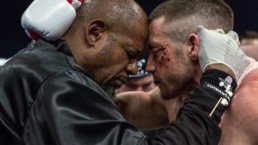Review: ‘Southpaw’
Despite the film’s dramatic tribulations, 'Southpaw' is impossible not to root for.
Jake Gyllenhaal’s resurgence as a bankable, “serious” Hollywood actor only speaks to the long list of films he has starred in to date. His current string of stunning performances dating back to 2011’s Source Code and leading up to last year’s snubbed Nightcrawler has been dazzling. The kid from Donnie Darko has actually grown into a pretty daring actor. He’s always been one though. In 2001, he flipped from the demented Bubble Boy to the seedy surrealism of Donnie Darko, 2005 saw him play his, at that point, brawniest role as a Gulf War soldier in the underrated Jarhead and then gather an Oscar nomination for his most tender and vulnerable role as a gay cowboy in Brokeback Mountain. Gyllenhaal has been a chameleon his entire career. With Southpaw, he is proving it louder than ever.
Southpaw follows the trials and tribulations of Billy “The Great” Hope (Gyllenhaal), the light heavyweight boxing champion of the world. Coming up through the system, Hope has risen to superstardom and great wealth alongside his wife Maureen (an impressive performance Rachel McAdams) and his daughter Leila (Oona Laurence). After his wife is tragically shot at a charity event, Hope falls into a pit of despair and poverty. When Leila is taken into child services, Hope turns his life around to get back into the ring and fight – literally and metaphorically – for his family and the good of himself.
If anything, the film is a triumph for its performances and a victory for Fuqua proving he can capably direct more than popcorn action.
The film is an impressive turn from director Antoine Fuqua, himself in a commercial renaissance following the back-to-back action success of Olympus Has Fallen and The Equalizer. Southpaw is a strong return to his dramatic peak over a decade ago with Training Day. The direction here is confident, though also vulnerable, something that Fuqua seemed to lack during the energetic masculinity and action ferocity of his preceding filmography. Not to undermine the aggressiveness in Southpaw, however, as it’s possibly the most brutal boxing film in more than a decade.
The boxing sequences themselves are, appropriately, the most visceral moments of the film. Gyllenhaal is a brute force in the ring eating up the scenes and spitting them out, bloodied. His punch-drunk performance is a spectacle, though unfortunately despite Gyllenhaal “The Great” Hope’s best efforts, he cannot lift the dramatic moments out of all too familiar territory. Southpaw is no Million Dollar Baby or The Fighter.
Fuqua’s directorial hand falls far too hard especially in the film’s former half. TV veteran Kurt Sutter’s screenplay is manipulative and inconsistent, to boot. A great performance by Forest Whitaker as Hope’s trainer in the latter acts adds a much-needed humanity that hoists the film up into the later rounds.
If anything, the film is a triumph for its performances and a victory for Fuqua proving he can capably direct more than popcorn action. Through all of the film’s dramatic tribulations, Southpaw is impossible not to root for.
Southpaw opens nationwide this Friday.
Jasper Bernbaum
Jasper is a contributing writer for Cinemacy. He combines his love of music with his visual eye into a passion for live photography. He holds a BFA in Film Production from Chapman University and is an avid filmmaker, watcher, and all around cultural adventurer.


